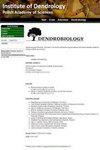The growth of seven Abies grandis provenances in the climatic conditions of the Polish Carpathian Mountains
IF 1.8
4区 农林科学
Q2 FORESTRY
引用次数: 4
Abstract
The introduction of foreign tree species to new areas facilitates an increase in species biodiversity and possibilities for growth of tree stands. Many years of research related to survival rate, basic growth features and evaluation of a sensitivity to climatic conditions of a new habitat is necessary to achieve a successful introduction. The paper presents the results of the research on the adaptation of grand fir to the climatic conditions in the provenance trial located in the lower montane forest belt. The dendroclimatic research has concerned the offsprings of 7 grand fir provenances originated from North America. A total of 24 trees from each provenance were selected and two cores from each tree were taken. Principal component analysis of tree-ring widths was used to classify the provenances. The climate elements described by PC1 and PC2 were identified on the basis of bootstrap correlation function. Survival rate, height and diameter at breast height of trees were also analysed. The features of the studied provenances showed significant differences. The variation of the inter-provenance survival rate and the increase in tree height of particular provenances were determined principally by the genotype. Grand firs trees from Region I exhibited superior survival rates and better dynamic increases in tree height. The variability of these two features had the character of clinal variation because they primarily depended on the elevation and the latitude of the maternal tree stands. Two groups of provenances which were connected with the regions of their natural distribution were characterized on the basis of the features of the short-term rhythm of the radial increments. The provenances of two specific groups revealed different sensitivity to temperature, rainfall, humidity and sunshine. The greatest effect on the variation of radial increments had been produced by the moisture and pluvial factors whilst the solar factor had produced the least effect on it. The air temperature made also a relatively high contribution to their radial increments. Grand fir trees from the Salmon River provenance in British Columbia provided the best trees from the cultivation point of view. The provenances from Vancouver Island and the western slope of the Cascadian Mountains in Washington State have been regarded as the best for introducing and acclimatising to the conditions of the Carpathian Mts.七种大冷杉在波兰喀尔巴阡山脉气候条件下的生长
引进外来树种到新地区有利于物种多样性的增加和林分生长的可能性。为了成功地引种,必须对新生境的存活率、基本生长特征和对气候条件敏感性的评估进行多年的研究。本文介绍了在低山林带种源试验中,杉木对气候条件的适应性研究结果。树木气候学研究涉及了源自北美的7个大冷杉种源的后代。每个种源共选择24棵树,每棵树取2颗核。利用树轮宽度的主成分分析对种源进行分类。利用自举相关函数对PC1和PC2描述的气候要素进行了识别。分析了树木的成活率、胸高和胸径。所研究种源的特征有显著差异。种源间成活率的变异和特定种源的树高增加主要由基因型决定。1区大冷杉表现出较好的成活率和较好的树高动态增长期。这两个特征的变异主要取决于母树林分的海拔和纬度,具有临床变异的特征。根据径向增量的短期节律特征,对与其自然分布区域相联系的两组种源进行了划分。两个特定种群的种源显示出对温度、降雨、湿度和日照的不同敏感性。湿度和降雨因子对径向增量的影响最大,太阳因子对径向增量的影响最小。气温对其径向增量也有较大的贡献。从栽培的角度来看,来自不列颠哥伦比亚省鲑鱼河种源的大冷杉树提供了最好的树木。来自温哥华岛和华盛顿州卡斯卡迪亚山脉西坡的种源被认为是引进和适应喀尔巴阡山脉条件的最佳种源。
本文章由计算机程序翻译,如有差异,请以英文原文为准。
求助全文
约1分钟内获得全文
求助全文
来源期刊

Dendrobiology
农林科学-林学
CiteScore
2.20
自引率
11.10%
发文量
17
审稿时长
>12 weeks
期刊介绍:
Dendrobiology publishes original research articles and review articles related to the biology of trees and shrubs.
 求助内容:
求助内容: 应助结果提醒方式:
应助结果提醒方式:


